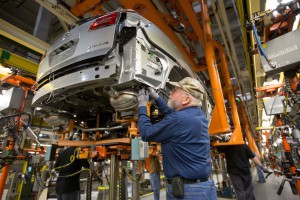
GM planned to lay off more than 1,000 employees at its Lansing Delta Township Assembly Plant, but now plans to bring back 500 of those workers.
Before President Donald Trump arrived in metro Detroit reiterating his threat to hammer companies that outsource jobs, General Motors announced plants to add 220 new jobs at a nearby auto plant.
The company add the new jobs and retain another 680 at plants across the state in the next year.
GM is adding the now spots at its Romulus Powertrain Plant to boost production of the 10-speed transmission it uses in multiple vehicles. It will also retain about 180 jobs by redeploying workers from its Lansing Delta Township Assembly plant to its Flint Assembly Plant for production of heavy-duty Chevrolet Silverado and GMC Sierra pickups.
The Lansing Delta Township plant has seen its workforce cut recently as vehicles have been moved to other U.S. facilities. GM announced it will lay off the third shift at the plant in May, affecting about 1,100 hourly and salaried workers.
(GM to lay off up to 1,100 Michigan workers. Click Here for the story.)
GM plans to reinstate about 500 jobs at plant in the first quarter next year to support production of the new generation Chevrolet Traverse and Buick Enclave SUVs.
“The job commitments announced today demonstrate the confidence we have in our products, our people and an overall positive outlook for the auto industry and the U.S. economy,” GM Chairman and CEO Mary Barra said in a statement.
(GM adding third shift at Tennessee plant. Click Here for the story.)
The Detroit-based automaker noted that 900 jobs are in addition to 7,000 U.S. jobs that have been created or retained in the U.S. as well as the $1 billion investment in U.S. facilities announced in January. The January announcements came out as rebuttal to Trump’s threat of a penalty imposed on automakers seeking to import vehicles into the U.S. from Mexico.
Trump has seen some push back on his desire to add a tariff to goods not just from the Mexican government, which has said it will walk away from NAFTA negotiations as soon as the word is uttered, but also from his own political party.
(To see more about GM idling five plants temporarily, including Lansing, Click Here.)
Additionally, the rhetoric has had the unintentional affect of causing the value of the peso to fall. If it falls enough, some analysts have suggested a “border tax” would be nullified because of the cost savings achieved from the lower peso would offset the cost of the tax.
